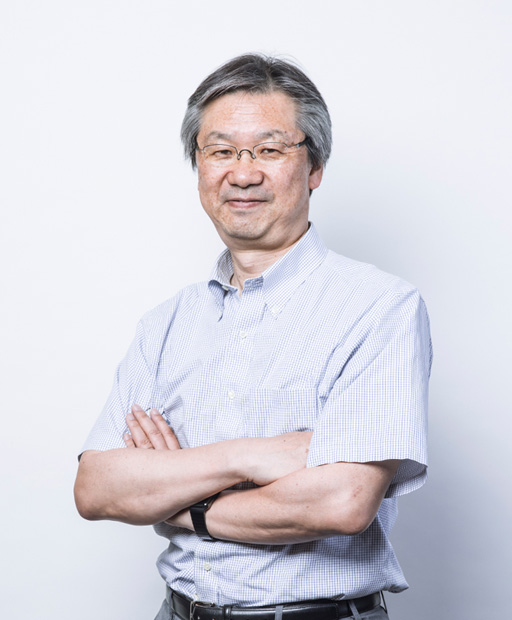

![]()
AMAGAI
MASAYUKI
Dean of Keio University School of Medicine
Making JKiC a place where young people gather, leading to innovation in Japan
JKiC is the first full-scale academic-corporate collaboration in Japan. What distinguishes this collaboration from previous industry-academia collaboration is that the parties involved will work in partnership with each other for the span of time such as ten or twenty years with a view to realizing eventual commercialization. I hope that JKiC will grow beyond a successful experience of one university and one company, leading to further innovation in Japan as a whole.
Since people with quite different backgrounds will be conducting collaborative work, there will certainly be differences in their views of common knowledge and many issues to be resolved. However, I sincerely hope that learning as they go through the process together, tackling the issues that arise, and developing the expertise for resolving these issues will all become opportunities for innovatively changing the academic-corporate collaborative relationship, and that this will become a model for industry-academia collaboration in Japan.
As the Dean of the School of Medicine, I would like to take the lead in thoroughly setting short-, medium- and long-term goals, and steadily producing results towards attaining each goal. Unless this foundation is clearly established, we will be unable to produce results over the span of ten or twenty years. As an original member of this project, I intend to exert leadership based on this perspective. In regard to goal setting, both JSR Corporation and Keio University will bring together their wisdom and listen to the views of a variety of people involved.
Although JKiC is located in Shinanomachi, we will not limit our activities to the School of Medicine, but will also collaborate with faculties related to life sciences such as the Faculties of Science and Technology, Pharmacy, and Nursing and Medical Care, as well as faculties related to social sciences such as the Faculties of Letters, Law, Economics, and Business and Commerce. Furthermore, JKiC will also collaborate with the Faculty of Policy Management and the Faculty of Environment and Information Studies at the Shonan Fujisawa Campus and Tsuruoka Town Campus, as well as the Institute for Advanced Biosciences, Keio University, I would like us to achieve success on an all-Keio basis.
In the end, what scientists consider most important is to make the world ultimately become abundant so that a large number of people can receive the benefits of such abundance.
Perhaps innovation is not limited to creative initiatives within the field of medicine, but instead lies in the process for social implementation.
While fostering people, universities continue to take a form in which the organization of the university evolves. Young people enter universities in rapid succession, and they engage in discussions on various ideas with people who have all kinds of established ways of thinking. Then, eventually those young people in turn will become the representatives of their generation, and transmit knowledge and wisdom to the next generation. I believe that this kind of continuation of people is one of the strengths of academia.
The first floor of JKiC will be opened widely to the public. I would like this Center to become a creative space. For example, t is a space where students and others come to take a break and have unexpected encounters and conversations in which they find hints that lead to ideas, which would not have come into being had they simply stayed stuck in front of their desks. To make this floor a place where people gather, we will stage and plan various kinds of events, for example, adding art to the space. The potential of young people is limitless. We will make JKiC into a place that continues to provide young people with a research environment that extends their growth curve.
-

- KOSHIBA
MITSUNOBUDirector, JSR Corporation
- KOSHIBA
-

- HASEYAMA
AKIRAPresident, Keio University
- HASEYAMA
-

- KAWAHASHI
NOBUORepresentative Director, President and COO, JSR Corporation
- KAWAHASHI
-

- AMAGAI
MASAYUKIDean of Keio University School of Medicine
- AMAGAI
-

- KIMURA
TORUChief Technology Officer
General Manager of Research & Development
- KIMURA
-

- KITAGAWA
YUKODirector General of Keio University Hospital
- KITAGAWA
-

- SUZUKI
KOJIDirector, Research & Development
Division, JKiC
- SUZUKI
-

- MATSUO
KOICHIDirector, Research & Development Division, JKiC
- MATSUO
-

- SHIOTA
ATSUSHIJKiC Industry-Academia-Medicine Collaboration Department Head
- SHIOTA
-

- SAYA
HIDEYUKIHead of JKiC Industry-Academia-Medicine Collaboration Department
- SAYA
-

- UENO
MASARUPrecision Medicine Area Leader
- UENO
-

- SAYA
HIDEYUKIPrecision Medicine Area Leader
- SAYA
-

- HAMADA
KENICHIStem Cell Biology & Cell Based Medicine Area Leader
- HAMADA
-

- OKANO
HIDEYUKIStem Cell Biology & Cell Based Medicine Area Leader
- OKANO
-

- SHIOTA
ATSUSHIMicrobiome Area Leader
- SHIOTA
-

- HONDA
KENYAMicrobiome Area Leader
- HONDA
-

- HAYASHIDA
TAIZODesigned Medical Device Area Leader
- HAYASHIDA
-

- NAKAMURA
MASAYADesigned Medical Device Area Leader
- NAKAMURA





